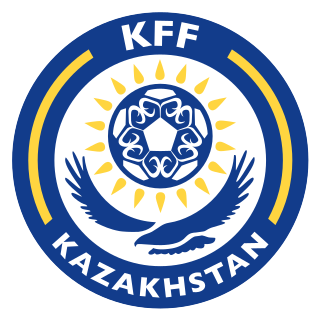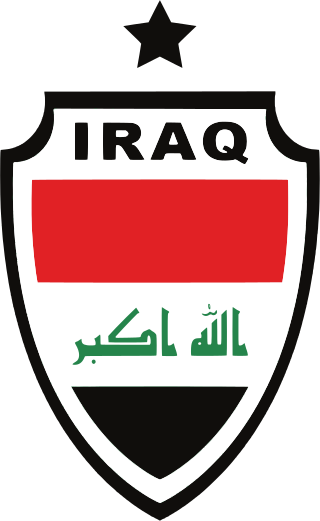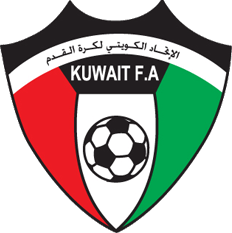The Iran national football team, recognised by FIFA as IR Iran, represents Iran in international senior football and is governed by the Football Federation Islamic Republic of Iran (IRI).

The Kazakhstan national football team represents Kazakhstan in men's international football and it is governed by the Kazakhstan Football Federation. They split from the Soviet Union national team after independence in 1991 and joined the Asian Football Confederation's Central Asian Football Federation. After failing to qualify for the 1998 and 2002 FIFA World Cups, they joined UEFA, but are yet to qualify for a FIFA World Cup or a UEFA European Championship.

The Saudi Arabia national football team (SAFF) represents Saudi Arabia in men's international football. They are known as Al-Suqour Al-Abiyyah and sometimes Al-Suqour Al-Khodhur, a reference to their traditional colours of green and white, and represent both FIFA and the Asian Football Confederation (AFC).

The Iraq national football team represents Iraq in men's international football and is controlled by the Iraq Football Association (IFA), the governing body for football in Iraq. Iraq's usual home venue is the Basra International Stadium.

The Kuwait national football team is the national team of Kuwait and is controlled by the Kuwait Football Association. Kuwait made one World Cup finals appearance, in 1982, managing one point in the group stages. In the Asian Cup, Kuwait reached the final in 1976 and won the tournament in 1980.

The Jordan national football team represents Jordan in international football and is controlled by the Jordan Football Association. Jordan have never qualified for the World Cup finals but have appeared five times in the Asian Cup and reached the final match of a major tournament for the first time in the 2023 edition, finishing as runners-up for the first time.
The Syria national football team represents Syria in international football, and is controlled by the Syrian Arab Federation for Football, the governing body for football in Syria. Syria has never qualified for the World Cup finals, but did reach the fourth qualification round in 2018. The team is currently banned by FIFA from playing at home, as they have not hosted a game since December 2010. Internationally, Syria won the 2012 WAFF Championship, 1957 Arab Games, 1987 Mediterranean Games, And the 2024 intercontinental cup
The Yemen national football team represents Yemen in men's international football and is administered by the Yemen Football Association.

The Palestine national football team, governed by the Palestinian Football Association, represents Palestine in association football. The squad is governed by the Asian Football Confederation (AFC) continentally, and FIFA worldwide.
Listed below are the dates and results for the 1986 FIFA World Cup qualification rounds for the Asian zone (AFC). For an overview of the qualification rounds, see the article 1986 FIFA World Cup qualification.

Al-Zawraa Sports Club is an Iraqi professional sports club based in Utayfia, Karkh District, Baghdad. Their football team competes in the Iraq Stars League, the top-flight of Iraqi football. Al-Zawraa have won the most major honours of any club in Iraq, having won 14 league titles, 16 Iraq FA Cups and 5 Iraqi Super Cups—all record totals.
In the final round of matches of the final round of Asian qualification for the 1994 FIFA World Cup, Japan and Iraq drew 2–2 in Doha, Qatar. If Japan had won the match, they would have qualified for the World Cup for the first time. Instead, Japan finished third in their group, allowing their arch-rivals South Korea to qualify instead. The Japanese refer to the match as the "Agony of Doha", whereas South Koreans, because the country's national football team only qualified in the final minutes of this match, refers to it as the "Miracle of Doha".
The Grand Hamad Stadium, also known as the Al–Arabi Sports Club Stadium, is a multi-purpose stadium in Doha, Qatar. The stadium holds 13,000 people, and is currently used mostly for staging football matches, as it is Al-Arabi SC's home ground. The stadium was used extensively during the 2006 Asian Games, and was a venue for several sports, including football, table tennis, rugby sevens, and fencing. The Iraq national football team played their 2014 FIFA World Cup qualification (AFC) matches at the stadium, as did the Yemen national football team in their 2018 FIFA World Cup qualification (AFC) matches. On March 10, 2022, the Brazil national football team announced that the Grand Hamad Stadium was selected as the team base camp during the 2022 FIFA World Cup.

Imad Ali Suleiman Al-Hosni, commonly known as Imad Al-Hosni or Al-Amda, is an Omani former professional footballer who played as a striker. He played for the Oman national team.
Ismail Sulaiman Ashoor Al-Ajmi, commonly known as Ismail Al-Ajmi, is an Omani footballer who plays for Al-Nahda Club in Oman Professional League.

The Asian Football Confederation (AFC) section of 2010 FIFA World Cup qualification was allocated four assured qualifying berths for the final tournament in South Africa and one place in a play-off. 43 teams were in the running for these spots, while Laos, Brunei and the Philippines did not enter qualification. This was the first time Timor-Leste competed in World Cup qualification and the first time Australia attempted to qualify for the World Cup as a member of the AFC, having moved from the Oceania Football Confederation at the start of 2006. Note that this edition saw the first effective participation of Myanmar. The country, called "Burma" until 1989, was registered three times but withdrew each time before playing.

This is a list of the Iran national football team's competitive records.
Fawzi Bashir Rajab Bait Doorbeen, commonly known as Fawzi Bashir, is an Omani former footballer who last played for Dhofar S.C.S.C. in Oman Professional League. He has also played for the Oman national team.
Waleed Salim Al-Lami is an Iraqi former professional footballer who played as a right back for Al-Shorta and the Iraq national team.

Ahmed Radhi Humaiesh Al-Salehi was an Iraqi footballer who played as a striker. Nicknamed "The Magician" in his playing days and regarded as one of Iraq's and Asia's best players of all time, Radhi scored the only Iraqi goal at the FIFA World Cup in its 1986 edition, a low shot to the corner of the net against Belgium in a 2–1 defeat. He was voted the Asian Footballer of the Year in 1988.










